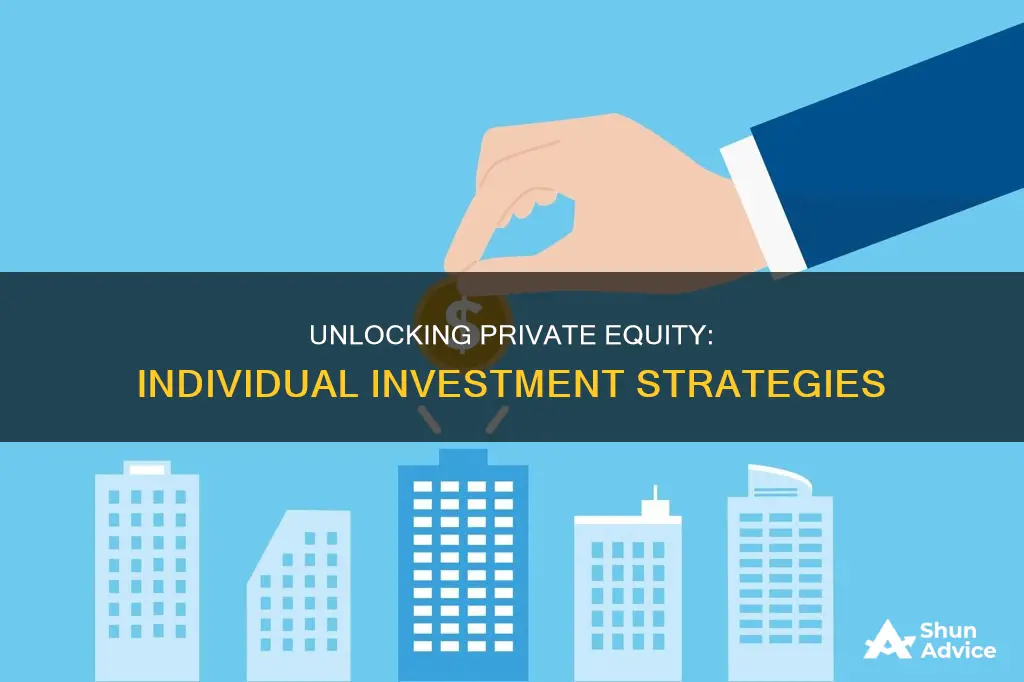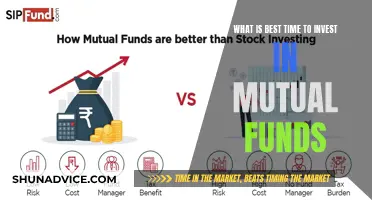
Private equity is an alternative investment class that allows investors to gain an ownership stake in private companies outside of the public stock market. It is a high-risk, high-reward investment strategy that typically requires investors to commit significant capital for long periods, making it an option primarily for institutional investors and high-net-worth individuals.
Private equity firms pool investors' money and make strategic decisions about how to invest it, specialising in venture capital, growth equity, or buyouts. While the high minimum investment requirements of private equity funds have traditionally made this asset class inaccessible to most individual investors, some firms have started lowering their minimum investment amounts, and there are also alternative ways to gain exposure to private equity.
| Characteristics | Values |
|---|---|
| Minimum Investment Requirement | Typically $25 million, but can be as low as $25,000 or even $250,000 |
| Investment Period | At least 10 years |
| Investor Type | Institutional investors and wealthy individuals |
| Investor Requirements | Accredited investor with a net worth of over $1 million or an annual income of over $200,000 |
| Types of Private Equity Investments | Buyouts, venture capital, growth equity, distressed investing, sector specialists, secondary buyouts, carve-outs |
| Risks | Very speculative and risky, illiquid, potential for high fees, limited transparency and regulation |
What You'll Learn

Understand the risks
Private equity investing can be very speculative and therefore very risky. There is no guarantee that the companies you invest in will succeed, and there are few protections for you if they fail.
Market Risk
Market risk is prevalent in private equity investing as many of the companies invested in are unproven, which can lead to losses if they fail to live up to expectations. Private equity investors also face greater market risk compared to traditional investments since there is no guarantee that the companies will grow at all. Failure is much more common among these companies, with only a small percentage making any significant return for the firm and its investors.
Liquidity Risk
Liquidity measures the ease with which investors can enter or exit investments. Private equity investors are expected to leave their funds with the firm for between four and ten years, or more, and are unable to redeem their investment during that period. This long lock-in period means that investors may not be able to access their funds when needed.
Operational Risk
Operational risk refers to the risk of loss resulting from inadequate processes and systems supporting the organisation. It is a key consideration for investors regardless of the asset classes that private equity funds invest in.
Funding Risk
Funding risk is closely related to liquidity risk. If investors are faced with a funding shortfall, they may be forced to sell illiquid assets to meet their commitments.
Capital Risk
The capital at risk is equal to the net asset value of the unrealised portfolio plus future undrawn commitments. In theory, all portfolio companies could experience a decline in their current value, and in the worst case, drop to a valuation of zero. Capital risk is closely related to market risk. While market risk is the uncertainty associated with unrealised gains or losses, capital risk is the possibility of having a realised loss of the original capital at the end of a fund's life.
Increased Vulnerability
As investors continue to increase their allocation to private equity, and fund managers manage increasingly large pools of capital, investors need to understand the increased vulnerability of their portfolios to private equity-specific risks, particularly under different market conditions.
Income Funds: The Right Time to Invest
You may want to see also

Learn the language of alternative investments
Before investing in private equity, it is important to understand the language and field of alternative investments. Alternative investments are any investments besides stocks, bonds, and cash. Private equity is one of the many strategies that make up the alternative investment asset class.
- Accredited Investor: According to the United States Securities and Exchange Commission (SEC), an accredited investor is an individual with a net worth over $1 million (excluding the value of their primary residence) or an income of more than $200,000 (or $300,000 with a spouse) in each of the last two years. Accredited investors are often required for alternative investments due to the lack of regulation and higher risk.
- Limited Partners: In the context of private equity, limited partners are the individual investors who contribute capital to private equity firms. They are protected from losing more than their original investment.
- General Partners: Private equity firms or entities that manage private equity funds and their investments are known as general partners. They pool the money from limited partners and make strategic decisions about how to invest it.
- Venture Capital: This is a type of private equity investment strategy that focuses on investing in early-stage startups.
- Growth Equity: Growth equity is another private equity strategy that involves investing in middle-stage companies to fuel their growth.
- Buyouts: Buyouts are a strategy where a private equity firm purchases a mature company outright with the goal of internal improvement before selling it again.
- Carried Interest: Carried interest is a share of the fund returns that make up a large portion of private equity fund managers' compensation. It is typically taxed as a long-term capital gain rather than income.
- Hurdle Rate: Also known as the preferred return, the hurdle rate is the minimum return that limited partners must earn before the general partner can collect carried interest.
- Drawdowns or Capital Calls: Drawdowns are requests for capital made by the general partner to the limited partners when a new investment opportunity arises.
- Vintage Year: The vintage year is the year in which a private equity fund first draws down or calls for committed capital from its limited partners.
- Cumulative Distributions: Cumulative distributions refer to the total returns paid out to limited partners over time.
- Residual Value: Residual value represents the market value of the remaining equity that limited partners have in the fund. It is often used to compare with the purchase price of the fund's investments to determine unrealized profits or losses.
- Investment Multiple: The investment multiple, also known as the total value-to-paid-in (TVPI) multiple, is a ratio used to evaluate fund performance. It is calculated by dividing the cumulative distributions and residual value by the paid-in capital.
- Realization Multiple: The realization multiple, or distributions-to-paid-in (DPI) multiple, is another ratio that provides insight into the fund's performance. It is calculated by dividing the cumulative distributions by the paid-in capital.
To gain a comprehensive understanding of alternative investments and private equity, it is recommended to explore educational resources such as online courses, books, and articles. Additionally, consider taking an online course specifically on alternative investments to deepen your knowledge and build a strong foundation.
Mutual Fund Dividends: When to Invest for Maximum Returns
You may want to see also

Become an accredited investor
Accredited investors are individuals or entities that are allowed to invest in securities that are not registered with the Securities and Exchange Commission (SEC). Accredited investors are typically wealthy individuals with access to investments that many others are not permitted to access. These investments include private equity, private placements, hedge funds, venture capital, and equity crowdfunding.
The SEC defines an accredited investor through income and net worth. To be considered an accredited investor, you must either:
- Earn an income of more than $200,000 (or $300,000 with a spouse) in each of the last two years with a reasonable expectation to earn the same for the current year.
- Have a net worth over $1 million, either individually or together with a spouse (excluding the value of a primary residence).
Other ways to qualify as an accredited investor include:
- Being a "knowledgeable employee" of a private fund.
- Being a registered investment advisor (SEC or state-level).
- Holding certain licenses, such as the Series 7, Series 65, or Series 82.
- Being a director, executive officer, or general partner of the company selling the securities.
- Being a "family client" of a "family office" that qualifies as an accredited investor.
It is important to note that there is no formal process or certification to become an accredited investor. The companies issuing unregistered securities determine a potential investor's status through due diligence. If you qualify as an accredited investor, you can seek out these unique investment opportunities to potentially build your wealth. However, it is essential to be aware of the risks associated with these investments, such as high minimum investment amounts, high fees, and illiquidity.
Target-Date Funds: Invest Now or Miss Out?
You may want to see also

Research and select a private equity firm
Once you have a foundational knowledge of the private equity industry and have become an accredited investor, the next step is to research and select a private equity firm to invest with. It is crucial to select a firm you trust, as the firm's managers will be responsible for allocating your investment capital and controlling investment decisions.
While many private equity firms spread investments across strategy and industry, some occupy niche intersections. Consider your preferences based on personal experience and industry trends. For example, if you are a seasoned tech entrepreneur, you may want to research venture capital firms specialising in technology.
When researching a firm, it is important to do your due diligence by looking into the firm's previous investments and the returns it has provided for its limited partners in the past. Most firms will provide information about companies in their portfolios and their general approach to investing. You should also read any resources a firm provides about its strategy, including corporate social responsibility reports, which can give details about the companies it chooses to invest in and the impact it has had on the environment and community.
Another important factor to consider is a firm's minimum investment requirement. Historically, the standard minimum investment amount for private equity has been $25 million. However, some firms have departed from this high threshold and now require as little as $25,000. Make this a key focus of your research to ensure your investment is a good fit for the firm you select.
Once you have selected a firm that fits your investment restrictions and interests, you will need connections in the field to get started. Many high-net-worth individuals use family offices or financial advisors because of their wide network of contacts in the investment space.
Tony Robbins' Guide to Index Funds Investing
You may want to see also

Track industry progress
Tracking industry progress is a crucial step in monitoring your private equity investments and staying informed about the performance of your portfolio. Here are some detailed instructions to help you track industry progress effectively:
- Set Clear Objectives and Metrics: Before investing, clearly define your financial expectations, strategic goals, and value creation plans. Determine key performance indicators (KPIs) such as revenue growth, EBITDA margin, cash flow, market share, customer satisfaction, and social impact. Regularly communicate and align these objectives with the management team of the portfolio company.
- Collect and Analyze Data: Gather data from various sources, including financial statements, operational reports, market research, and customer feedback. Establish a consistent and standardized reporting format and frequency for your portfolio companies. Utilize a central database or platform to store and access this data efficiently. Apply analytical tools such as dashboards, benchmarks, ratios, and trends to identify patterns, gaps, and opportunities within your portfolio.
- Utilize Portfolio Management Software: Leverage specialized portfolio management software designed for private equity firms to automate and streamline data collection and analysis. These tools can provide valuable insights and recommendations based on your objectives. Create and share reports, charts, and presentations with internal and external stakeholders for enhanced collaboration.
- Review and Adjust Your Strategy: Regularly evaluate your portfolio's performance against your set objectives and metrics. Compare it with market and industry standards. Seek feedback from your portfolio companies and industry experts regarding challenges and opportunities. Based on your findings, adjust your strategy accordingly, such as providing additional support or capital, exiting underperforming investments, or acquiring new ones.
- Stay Informed on Industry Trends: Monitor trends in the specific industries of the companies you have invested in, as well as broader private equity and alternative investment industry trends. This will help you anticipate potential impacts on your investments and make more informed decisions.
- Learn and Adapt: Continuously learn from your experiences and document your best practices and lessons learned. Share this knowledge with your team to enhance your collective skills and decision-making abilities. Stay up-to-date with the latest trends and developments in the private equity industry to optimize your portfolio's performance and achieve your desired outcomes.
Fidelity Investments: Where to Find Their Offices
You may want to see also
Frequently asked questions
Private equity is a form of investment that takes place outside of the public stock market. Investors gain an ownership stake in private companies.
Private equity investing is typically reserved for institutional investors or high-net-worth individuals. To be considered an accredited investor, you must meet certain income or net worth requirements.
Private equity firms pool investors' money and make strategic decisions about how to invest it. They may invest in early-stage startups, middle-stage companies, or buyouts of mature companies.
Private equity offers the potential for higher returns than the public market. Private equity valuations are not influenced by the larger market, and private companies have more flexibility in their accounting practices.
Private equity is a high-risk investment with limited regulatory protection. It is also highly illiquid, with long investment horizons typically of at least 10 years.







